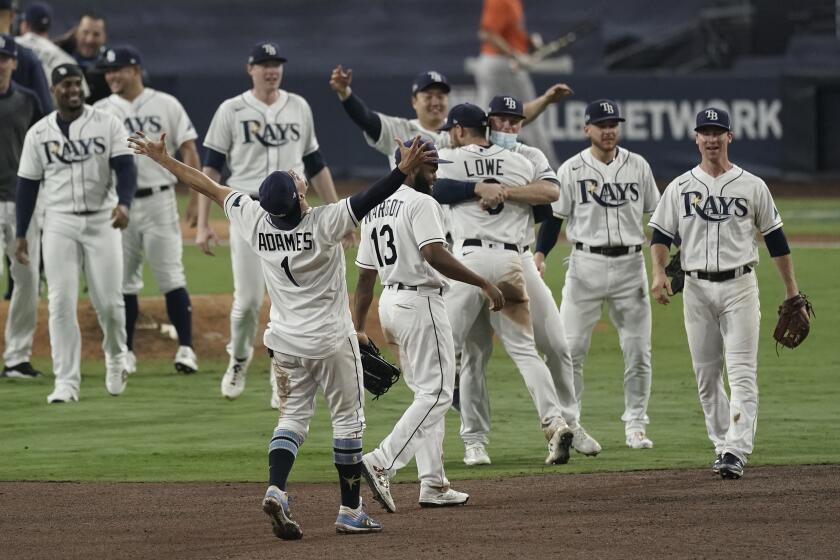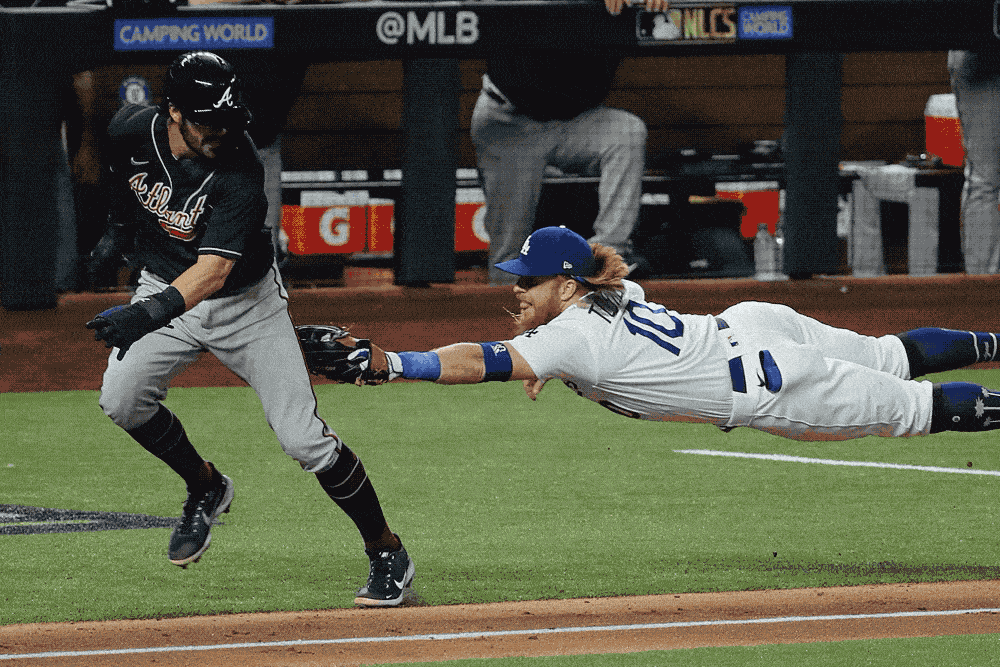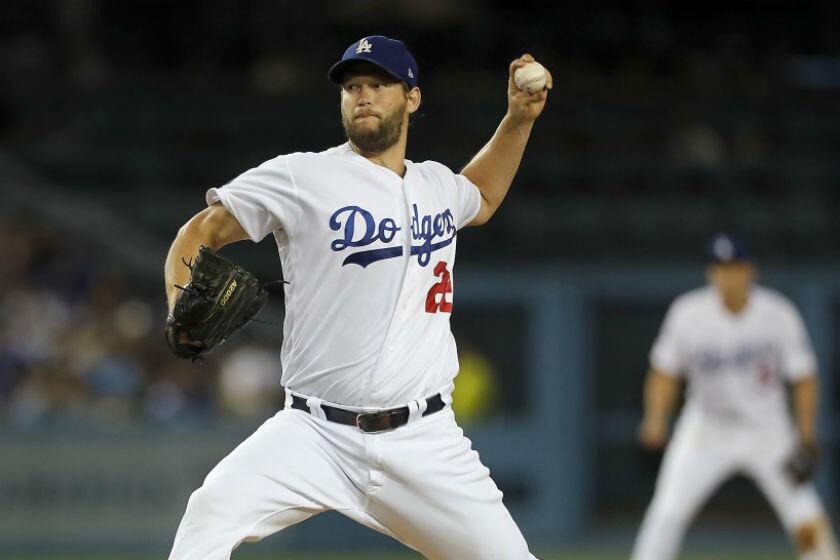Rays still zig while others zag, long after Andrew Friedman left for the Dodgers
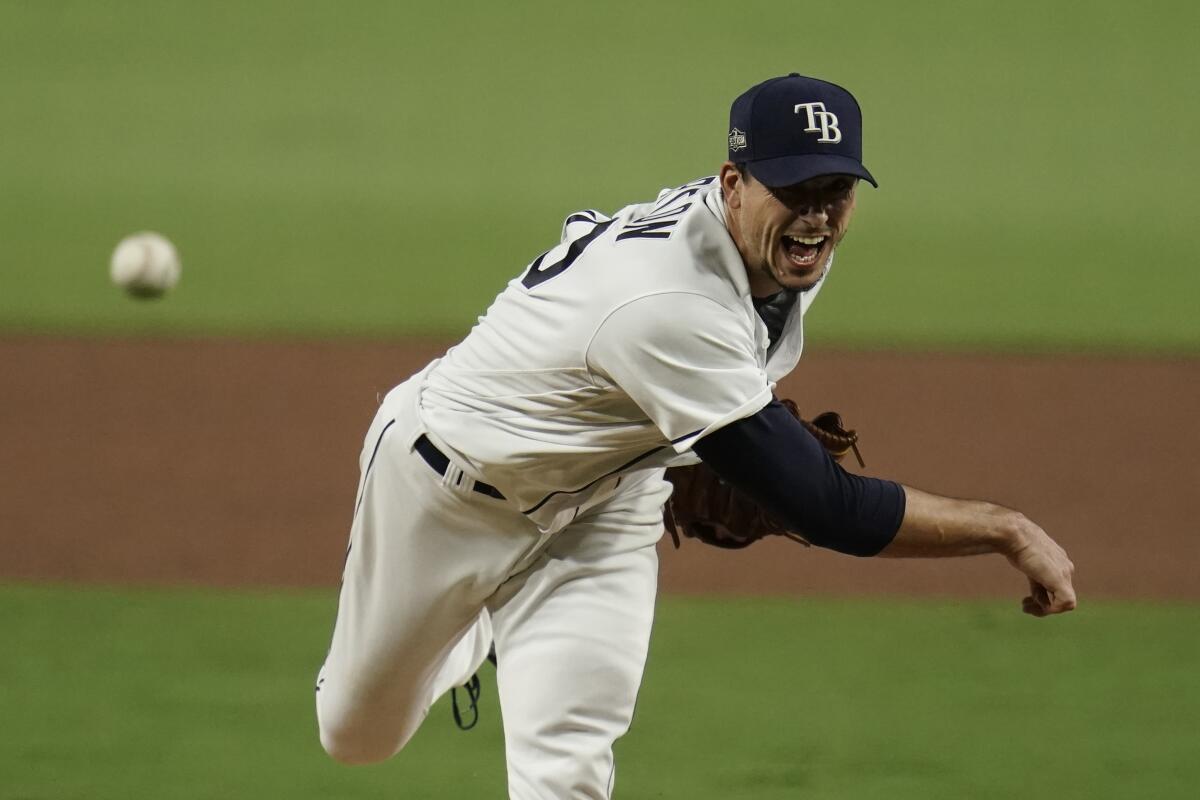
- Share via
Andrew Friedman was 28, two years removed from Wall Street, when he was handed control of a dysfunctional major league team after the 2005 season. He promptly hired as his manager Joe Maddon, an Angels coach whom the Angels twice had passed over for their manager’s job.
The team was the Tampa Bay Devil Rays. Never since the franchise was born in 1998 had the team lost fewer than 91 games in a season. As Maddon recalled Monday, the civic debate at the time was whether the team would have to escape the American League East in order to contend, lest it be forever doomed by the big spenders in New York and Boston.
They ditched the “Devil” from their name and roared into the World Series in 2008, powered more by smarts than by dollars. Now, in 2020, the World Series features Friedman’s Dodgers against the Rays.
“If it boils down to pitching, heads up,” Maddon said. “That’s where the Rays can beat them.”
The small-market Tampa Bay Rays defeated the New York Yankees and the Houston Astros to reach the World Series and face the Dodgers.
If the Rays win, the fans of Los Angeles would be crushed because the Dodgers would have lost the World Series three times in four years. But fans of teams outside of the mega-markets would be delighted because it would put pressure on their teams to put up or shut up.
The point of the game is to win the World Series.
That bears repeating because fans too often are promised a process. Trust the process, or so the saying goes. But this is a saying too: The end justifies the means. In baseball, the end is a championship.
Executive Billy Beane has led the Oakland Athletics to the playoffs 11 times but never to the World Series. They did it make it to the American League Championship Series once and were swept.
Owners rushed to embrace analytics, for innovation and cost efficiency, and not necessarily in that order. Tanking became the flavor of the moment, lowering the payroll and alienating the fan base in the promise of brighter years ahead. The lords of the sport repeatedly pointed to the Chicago Cubs and Houston Astros as proof of concept: tear down, build back, win the World Series.
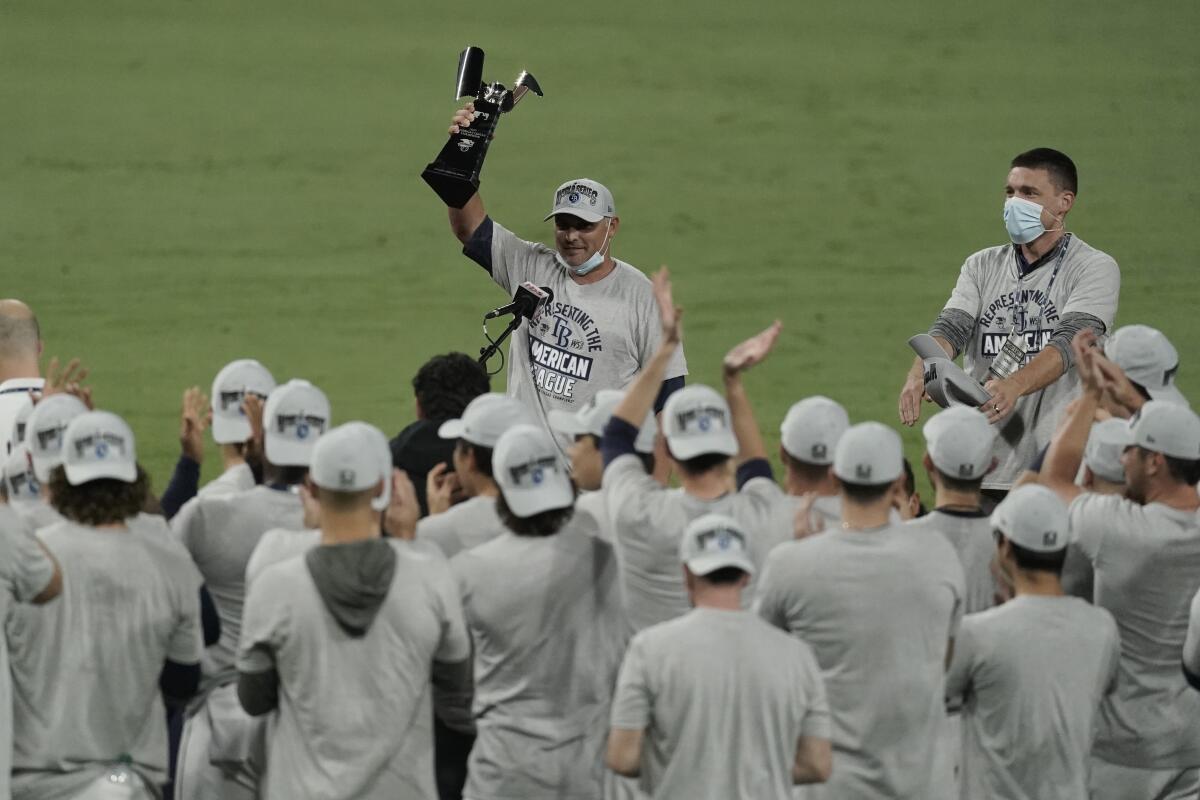
“Having a limited amount of money to spend, you have to be more accurate with your bow and arrow. They don’t miss.”
— Joe Maddon, Angels manager and former Rays manager on how Tampa Bay scouts talent.
But the Cubs and Astros are large-market teams. The Boston Red Sox won a World Series with analytics, but they also signed David Price for $217 million and Chris Sale for $145 million. The Dodgers love analytics so deeply that they converted a Dodger Stadium clubhouse to accommodate their enormous research and development department, but they committed $392 million to outfielder Mookie Betts.
The last small-market team to win the World Series? The Kansas City Royals in 2015, and their success was not in the numbers. They put shortstop Alcides Escobar and his .293 on-base percentage in the leadoff spot, and manager Ned Yost called it “Esky magic.”
The lesson of “Moneyball” was not to lionize on-base percentage. It was to celebrate the confidence of a team that had identified its best chance to win as zagging when the industry was zigging.
“I don’t think you ever want to see there be one particular cookie-cutter form of success in anything,” Rays general manager Erik Neander said. “That’s not what makes it fun.
“I’m really happy for our group that we have the opportunity to be on this stage. Our brand of baseball is not the same as the Astros and the Yankees. … To show that there are different ways to do this, sure, I think that’s great for baseball. By no means is this the only way, whatever this way is. We’re just a good team right now.”
And not just this year. The Rays put up the best record in the AL this year, going 40-20 in the abbreviated regular season, won 96 games last year and won 90 games the year before that.
In Game 7 of the ALCS, the Rays’ Charlie Morton had pitched 5 2/3 scoreless innings, with the potential tying run due up. Tampa Bay manager Kevin Cash made the data-driven decision to remove Morton, whom the team had decided should not take a third trip through the Houston lineup.
Through gutsy performances from Cody Bellinger, Mookie Betts and Corey Seager, the Dodgers showed their resilience in a stunning series comeback against the Braves.
“I try not to use gut feel,” Cash told MLB Network Radio last year. “If we’re using gut feel, we’re not prepared as a staff.”
Maddon, now manager of the Angels, watched on television and said he noticed how Morton did not throw a fit. If you are going to make data-driven decisions, no matter how unorthodox they might be, you better have players willing to go along with them.
“Everybody is looking at analytics as being the end-all,” Maddon said. “It’s not. It’s the players you acquire.
“What is your criteria for acquiring these players, beyond some kind of mathematical cocktail?”
The Rays acquired Tyler Glasnow, who will start Game 1 of the World Series, and outfielder Austin Meadows from the Pittsburgh Pirates for veteran pitcher Chris Archer, a trade Maddon said he liked so much he texted Rays executives to congratulate them on it.
Blake Snell, the Game 2 starter, was a first-round draft pick. Morton, in line to start Game 3, was that rare free-agent splurge, signed at age 35 for $15 million per year.
“Having a limited amount of money to spend, you have to be more accurate with your bow and arrow,” Maddon said. “They don’t miss.”
As expected, veteran Clayton Kershaw will start for the Dodgers against the Tampa Bay Rays in Game 1 of the World Series on Tuesday.
When Friedman ran the Rays, he delighted in the big-money signings of the Yankees and Red Sox because so many tended to go so poorly. Indeed, in between the Rays’ World Series appearances of 2008 and 2020, the Yankees made the World Series just once.
By the time last year rolled around, and just one year after they had won the World Series, the Red Sox owners had become so frightened by their top-heavy payroll that they fired Dave Dombrowski as their general manager and replaced him with Chaim Bloom, hired away from the Rays.
Bloom, in search of the coveted financial flexibility, traded Betts to the Dodgers. It is an embarrassment to Boston: A team with the resources of the Red Sox never should need to trade a franchise player. It is an intriguing story line: One former Rays executive could end up helping another former Rays executive keep the Rays from winning the World Series.
Yet most of what you hear about this World Series will be about payroll disparity and how the Dodgers are paying about as much to Betts and Clayton Kershaw this season as the Rays are paying to their entire team. If the Rays can win with smart management, fans of every team across Middle America ought to be demanding the same of their team.
Shaikin reported from Los Angeles.
More to Read
Are you a true-blue fan?
Get our Dodgers Dugout newsletter for insights, news and much more.
You may occasionally receive promotional content from the Los Angeles Times.

